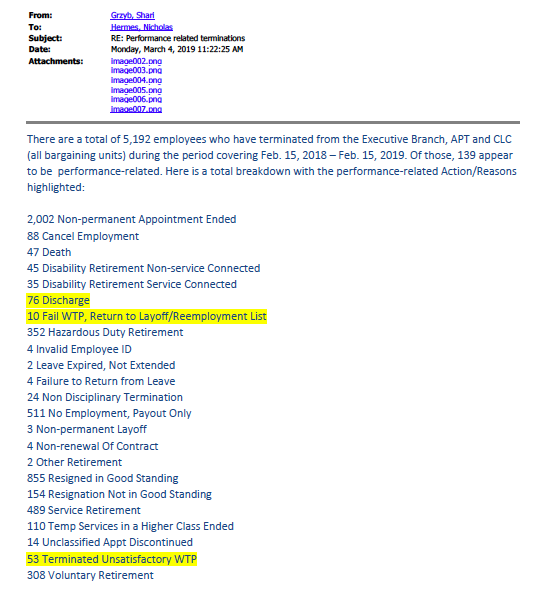Out of roughly 30,000 state employees in the executive branch only 139 were discharged for work performance issues over the course of a year, according to figures revealed through a Freedom of Information Request.
According to the information, between February of 2018 and February of 2019, a total of 5,192 state employees separated from employment, 2,002 of which were non-permanent appointments and 1,229 of which were retirements – the two largest categories of separation.
The total number of employees in the executive branch did not include employees in higher education, but does include the Connecticut Lottery Corporation and the Connecticut Airport Authority.
Of the employees terminated, 63 of them were discharged during their working test period, meaning they were not yet considered “permanent employees” and can more easily be let go if they were underperforming.
The remaining 76 employees who were “discharged” during that one-year time frame amounts to .2 percent of the employee pool of 30,000.
The information could mean Connecticut has some of the best performing employees in the country – even federal employees are terminated for poor performance at a rate of .5 percent – or it could mean that the path to discipline and termination is long and difficult.
That could be both good and bad: state employees should not have to worry about termination without legitimate reason — particularly in a politically-charged atmosphere like state government — but termination shouldn’t be so arduous as to allow for on-going performance problems that may drag down productivity and workplace morale.
Connecticut’s private sector, like many other states, is an “at-will” state for employers, meaning employers in the private sector can terminate employment for any reason provided the termination doesn’t violate public policy or an “implied employment contract.
Connecticut’s state workforce, however, is governed, by and large, through collective bargaining contracts that outline the restrictions and steps placed on management for performance reviews and employee discipline.
The stipulations of the contracts are largely similar, according to a review of executive branch labor contracts.
Most new employees are given a six-month working test period, after which they become permanent employees. Permanent employees can be subject to working test periods if they switch positions or are promoted but if their performance is unsatisfactory they are simply moved to a different position.
State employees receive annual service ratings, which are regulated by the union contract as well. Service ratings affect whether or not an employee can move up in job classification or receive their annual increment wage increase.
According to the Administrative and Residual Employees Union contract, any employee who receives a “less than good” evaluation to be provided with a remedial plan for improvement, which must be in place for six months before a second “less than good” service rating is allowed.
An employee may appeal their service rating, forcing the evaluator to bear “the burden of demonstrating the appropriateness of said evaluation,” according to the A&R contract.
Lastly, the state must show “just cause” for terminating an employee, which, according to Connecticut’s state agency regulations can range from two unsatisfactory service ratings within two years to insubordination to conviction of a crime while on duty.
However, the employee and their union can file a grievance against any discipline including termination. The matter is then put before the Connecticut State Labor Relations Board or an arbitrator to consider whether or not the discipline was just.
The grievance arbitration procedure is also governed by the collective bargaining agreement and requires time and money for both the union and the state.
If the arbitrator determines the state could not show just cause or has applied discipline in an unequal manner, they can order the employee reinstated with back pay. The grievance process can sometimes take years and back pay can be substantial.
Perhaps the most infamous example of arbitration reinstating a fire employee is that of a UConn Health maintenance worker fired after he was caught smoking marijuana on the job. An arbitrator overturned the firing and the ruling was upheld by the Connecticut Supreme Court
But the limitation on the state’s ability to terminate employees is not confined unionized workers. The termination of high-profile commissioners, directors and communications directors can also prove difficult.
Connecticut has a State Employees Review Board that handles appeals of state managers and other employees not represented by a union.
In 2014, Gov. Dannel Malloy’s administration fired the head of the Office of Labor Relations Linda Yelmini under the auspices of “reorganizing.” Yelmini filed a grievance against her dismissal with the State Employees Review Board and was reinstated to her position with a settlement of $325,000.
The state of Connecticut may learn that lesson again, following a high-profile dismissal of Department of Public Health Communications Director Av Harris, who has filed suit in court against his sudden termination.
Gov. Ned Lamont’s administration has been moving to consolidate and centralize human resources operations in the executive branch, part of his plan to streamline and update state services.
In 2019, the governor issued an executive order “which directs the execution of a human resources centralization plan in order to provide state government with the highest quality human resources services at the lowest possible cost,” the press release stated.



Christopher Albani
March 15, 2021 @ 12:18 pm
YOu shoUld See the employment cOntRact fOr the connecticut airport autHority EXECUTIVE directOr. If he gets FirEd they agreed to pay him 18 months salary. I have foi’ed the emPlOyment cOntraCt and related documeNts if you would like A copy.
James wheeling
March 15, 2021 @ 1:02 pm
Ct. Taxpayers are not getting thier moneys worth. Teach and let managers how to manage and use progressive disciplinary action to remove employees that are not performing to the standards which they should be. It is far to easy for underperforming employees to remain in positions that they should not be In. Allow human resources to assist the managers to achieve higher standards where employees produce. Employees that fail to produce need to be removed. It would never be tolerated in the private sector!!!
stephEn Malloy
March 16, 2021 @ 7:21 pm
State of ConnecTicut employee article yAnkee insTitute March 2021
Anonymous
March 29, 2021 @ 2:29 pm
How about installing time clocks in places of employment(institutions,group homes) for sTate workers.
As a recent state employee, Tracking time accurately is one of the biggest abuses within state facilities.
Ive seen several staff over The yearS Consistently on a daily basis signing in for correct time even though they were 15, 30 MINUTES in some instances hours late.
Its a culture that has been IMBEDDED to be acceptable.
If a staff were to objects or speaks up to the inaccurate sign in abuse Their met wiTh resisTance and many times retaliation.
This adds Up to a lot of money. The state and union (1199) have condoned this NEGLIGIBLE culture and have done NOTHING to correct this Fiscal Irresponsibility.
Installing TIME CLOCKS Would alleviate
This abUse.